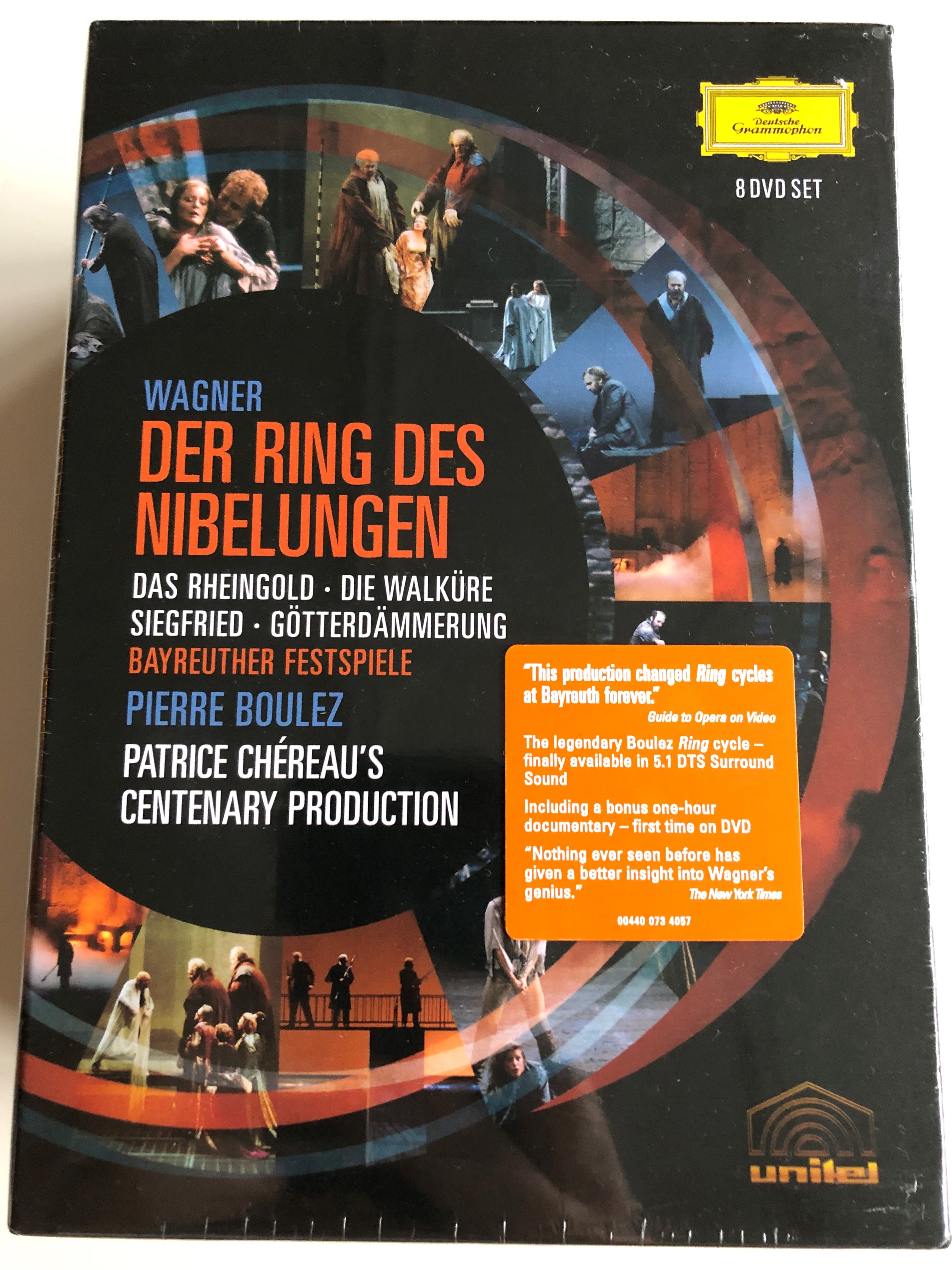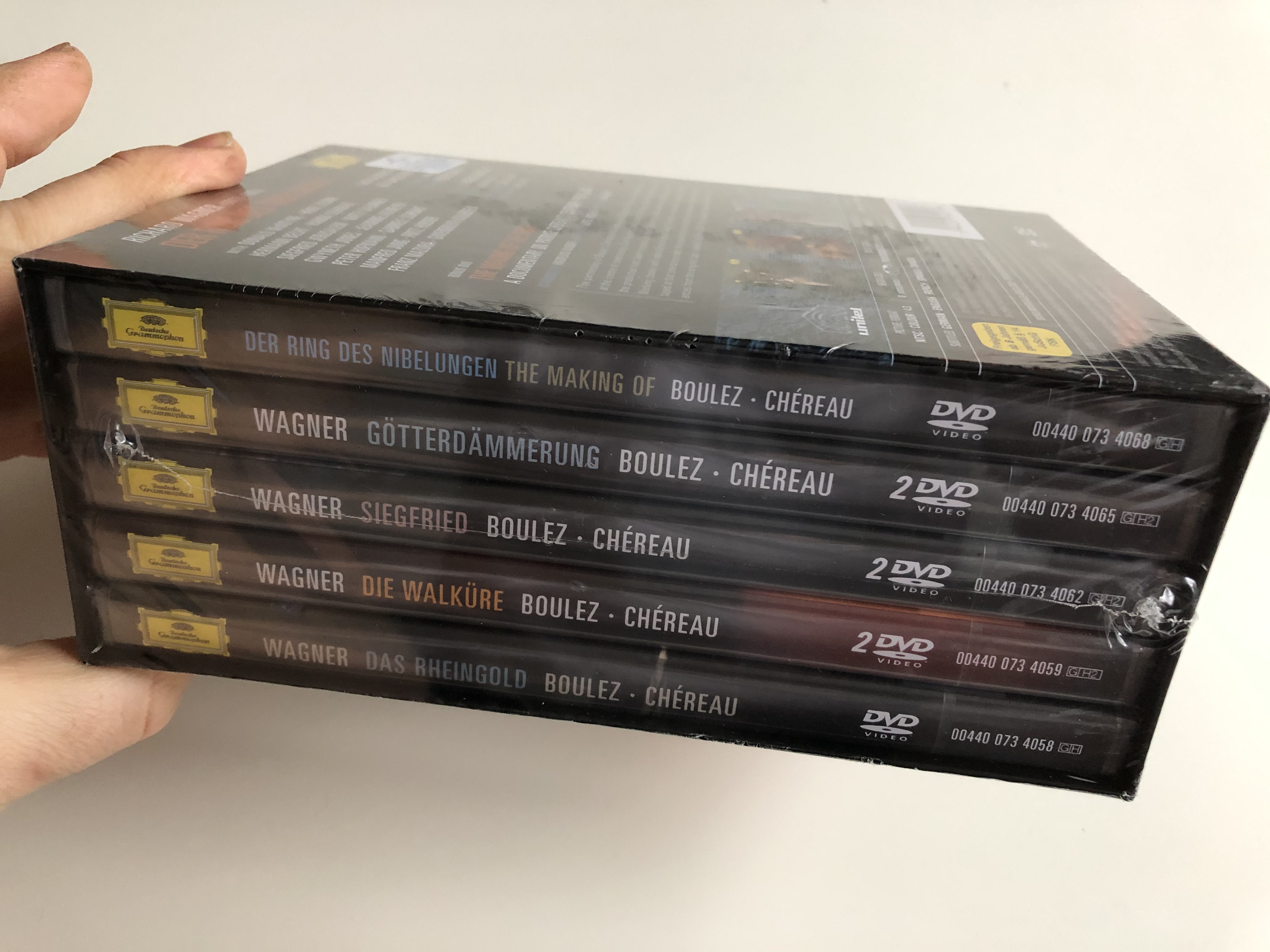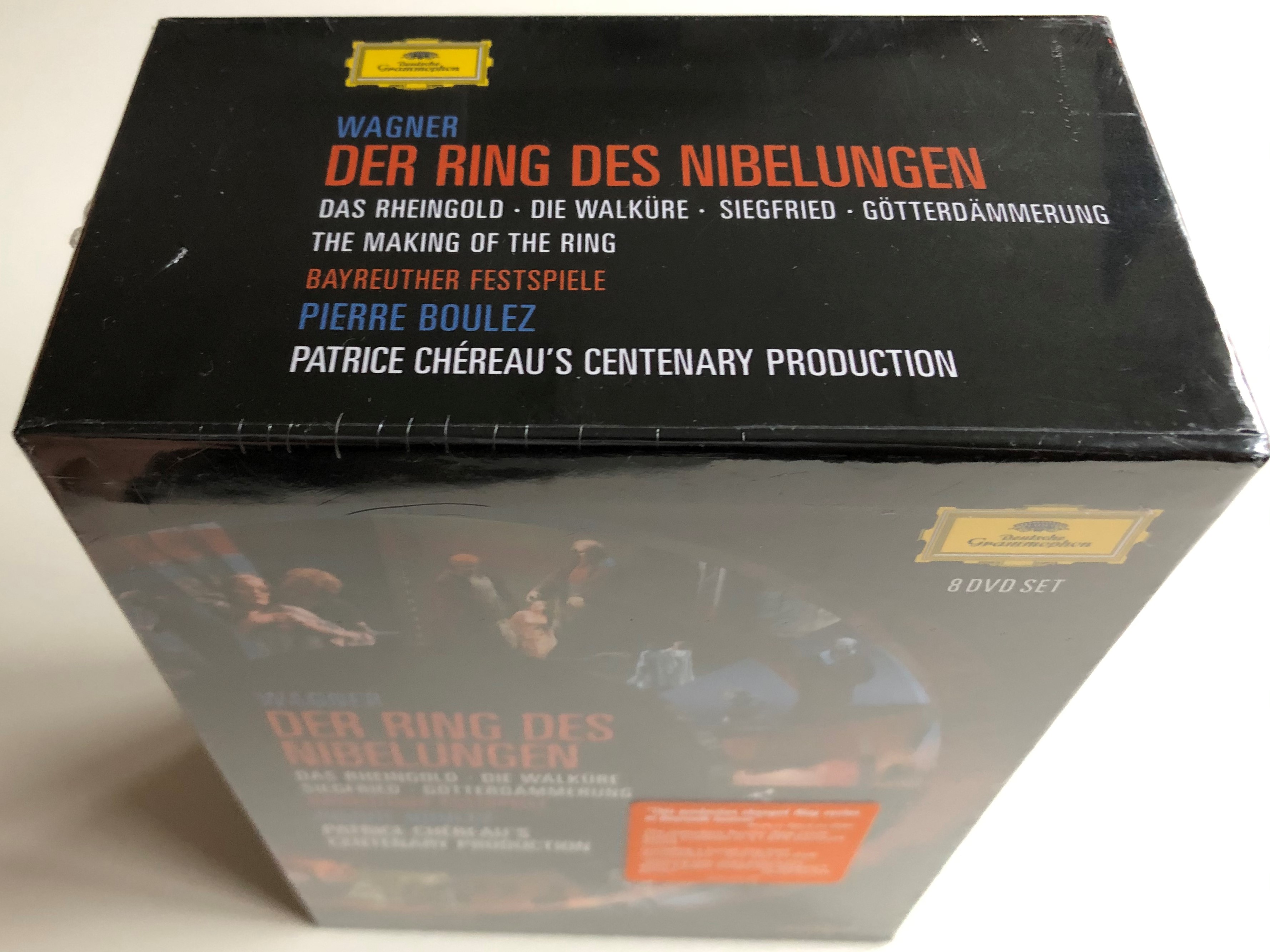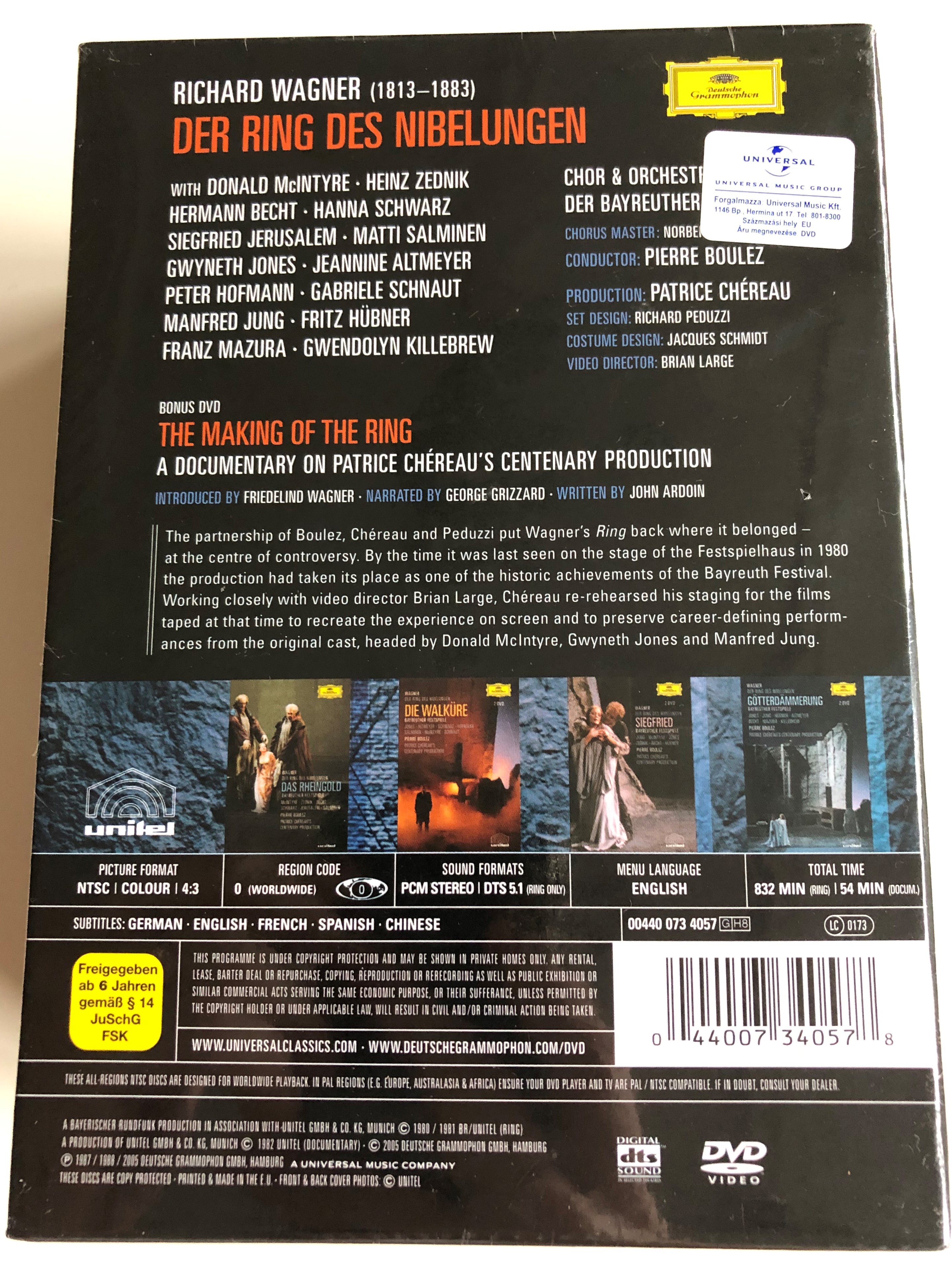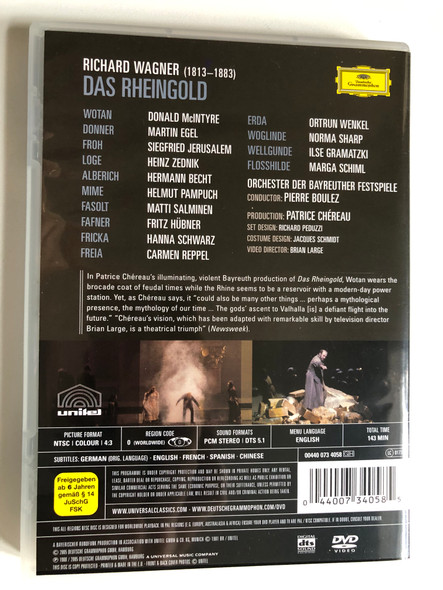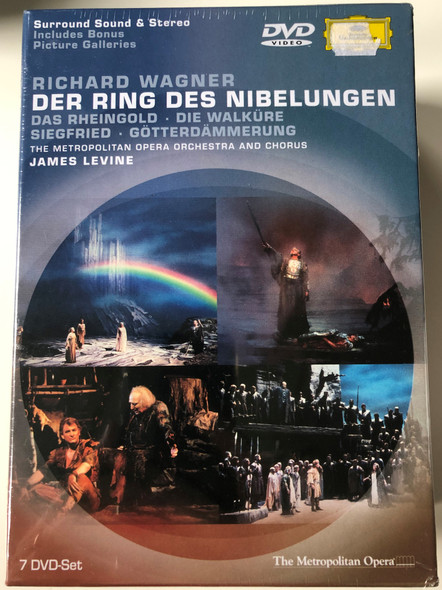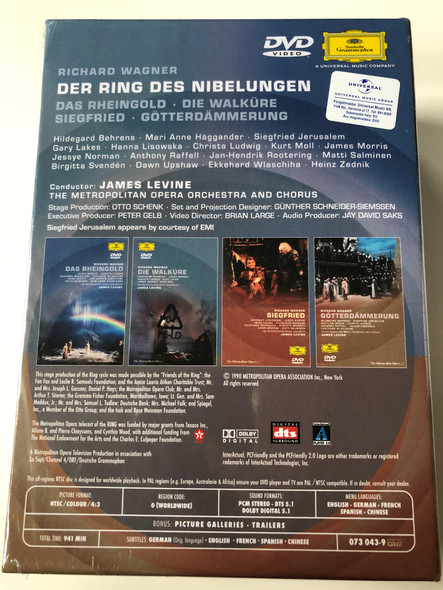Description
R. Wagner - Der Ring des Nibelungen 8 DVD SET 1980 Bayreuther Festspiele / Pierre Boulez / Directed by Brian Large / Patrice Chéreau's Centenary Production / Bonus - Making of the Ring documentary / Deutsche Grammophon
UPC 044007340578
MADE IN EU
REGION 0 NTSC DVD (ALL REGIONS)
AUDIO: Pcm Stereo, DTS 5.1
Subtitles: English, German, French, Spanish, Chinese
TOTAL RUNTIME: 832 MINUTES (54 min documentary) - 8 discs
English Summary:
Includes: Das Rheingold, Die Walkre, Siegfried, Gotterdammerung Presented by the Choir and orchestra of the Bayreuth Festival.
Richard Wagner’s Der Ring des Nibelungen directed by Patrice Chéreau at Bayreuth Festspiele in 1980.
Der Ring des Nibelungen (The Ring of the Nibelung) is a cycle of four epic operas (or “dramas” to use the composer’s preferred term) by the German composer Richard Wagner (1813–83). The works are based loosely on characters from the Norse sagas and the Nibelungenlied. The four dramas, which the composer described as a trilogy with a Vorabend (“preliminary evening”), are often referred to as the Ring Cycle, Wagner’s Ring, or simply the Ring.
Wagner wrote the libretto and music over the course of about twenty-six years, from 1848 to 1874. The four operas that constitute the Ring cycle are, in sequence:
Das Rheingold (The Rhine Gold)
Die Walküre (The Valkyrie)
Siegfried
Götterdämmerung (Twilight of the Gods)
Although individual operas of the sequence are sometimes performed separately, Wagner intended them to be performed in series.
DVD BOX Contents:
Götterdämmerung (2 DVD)
Götterdämmerung, the fourth of Richard Wagner's four Ring operas. The cast features Manfred Jung as Siegfried and Gwyneth Jones as Brünnhilde, with music provided by Bayreuther Festspiele Orchester conducted by Pierre Boulez. This title is available in a boxed set with the other Ring operas, Das Rheingold, Die Walküre, and Siegfried.
Siegfried (2 DVD)
The third opera in Richard Wagner's epic Ring cycle, Siegfried follows the adventures of the son of demigods Siegmund and Sieglinde as he conquers his enemies and rescues the beauteous Brunnhilde with the help of his magic sword. This video preserves the controversial 1976 Bayreuth Centenary production, with Pierre Boulez leading the Bayreuth Festival Orchestra. Manfred Jung leads the cast as Siegfried, with Gwyneth Jones as Brunnhilde, Donald McIntyre as the Wanderer, and Hermann Becht as Alberich.
Die Walküre (2 DVD)
The second part of Patrice Chérau's epoch-making Bayreuth Ring is a radical re-imagining of Die Walküre, unprecedented in its psychological penetration. This production of " Die Walkure," staged as part of Patrice Chereau's Centenary celebration marking the 100th anniversary of the completion of the "Ring," this lavish performance features Donald McIntyre as Wotan, Peter Hofmann as Siegmund, and Gweneth Jones as Brunnhilde; Pierre Boulez conducts the Orchester Der Bayreuther Festspiel.
Das Rheingold DVD
This is a beautifully conducted and thoughtfully staged performance of the first opera (the prologue) in Wagner's Ring Cycle. As soon as the clouds of mist have dissipated, while the daring, long-held opening chord is still reverberating, the screen clears to show not only the River Rhine and the three maidens.
BONUS DVD - THE Making of the RING
A documentary on Patrice Chéreau's Centenary Produciton
Introduced by Friedelind Wagner - Narrated by George Grizzard - Written by John Ardoin
The partnership of Boulez, Chéreau and Peduzzi put Wagners Ring back where it belonged — at the centre of controversy. By the time it was last seen on the stage of the Festspielhaus in 1980 the production had taken its place as one of the historic achievements of the Bayreuth Festival. Working closely with video director Brian Large, Chéreau re-rehearsed his staging for the films taped at that time to recreate the experience on screen and to preserve career-defining performances from the original cast, headed by Donald Mcintyre, Gwyneth Jones and Manfred Jung.
Cast & Crew
| Director | Patrice Chéreau |
| Composers | Richard Wagner (1813-1883) |
| Artists | Bayreuther Festspiele Orchestra, Pierre Boulez (*1925), Donald McIntyre, Heinz Zednik, Hermann Becht, Hanna Schwarz, Matti Salminen, Fritz Hübner, Carmen Reppel, Martin Egel, Siegfried Jerusalem, Helmut Pampuch, Ortrun Wenkel, Norma Sharp, Ilse Gramatzki, Marga Schiml, Peter Hofmann, Jeannine Altmeyer, Gwyneth Jones, Karen Middleton, Gabriele Schnaut, Gwendolyn Killebrew, Katie Clarke, Elisabeth Glauser, Manfred Jung, Franz Mazura |
| Label | Deutsche Grammophon |
Der Ring des Nibelungen (The Ring of the Nibelung), WWV 86, is a cycle of four German-language epic music dramas composed by Richard Wagner. The works are based loosely on characters from Norse sagas and the Nibelungenlied. The composer termed the cycle a "Bühnenfestspiel" (stage festival play), structured in three days preceded by a Vorabend ("preliminary evening"). It is often referred to as the Ring cycle, Wagner's Ring, or simply The Ring.
Wagner wrote the libretto and music over the course of about twenty-six years, from 1848 to 1874. The four parts that constitute the Ring cycle are, in sequence:
- Das Rheingold (The Rhinegold)
- Die Walküre (The Valkyrie)
- Siegfried
- Götterdämmerung (Twilight of the Gods)
Individual works of the sequence are often performed separately,[1] and indeed the operas contain dialogues that mention events in the previous operas, so that a viewer could watch any of them without having watched the previous parts and still understand the plot. However, Wagner intended them to be performed in series. The first performance as a cycle opened the first Bayreuth Festival in 1876, beginning with Das Rheingold on 13 August and ending with Götterdämmerung on 17 August. Opera stage director Anthony Freud stated that Der Ring des Nibelungen "marks the high-water mark of our art form, the most massive challenge any opera company can undertake."
Wilhelm Richard Wagner (/ˈvɑːɡnər/ VAHG-nər, German: [ˈʁɪçaʁt ˈvaːɡnɐ] 22 May 1813 – 13 February 1883) was a German composer, theatre director, polemicist, and conductor who is chiefly known for his operas (or, as some of his mature works were later known, "music dramas"). Unlike most opera composers, Wagner wrote both the libretto and the music for each of his stage works. Initially establishing his reputation as a composer of works in the romantic vein of Carl Maria von Weber and Giacomo Meyerbeer, Wagner revolutionised opera through his concept of the Gesamtkunstwerk ("total work of art"), by which he sought to synthesise the poetic, visual, musical and dramatic arts, with music subsidiary to drama. He described this vision in a series of essays published between 1849 and 1852. Wagner realised these ideas most fully in the first half of the four-opera cycle Der Ring des Nibelungen (The Ring of the Nibelung).










